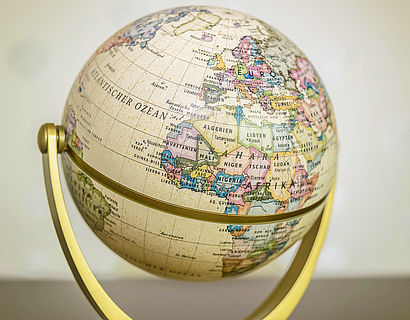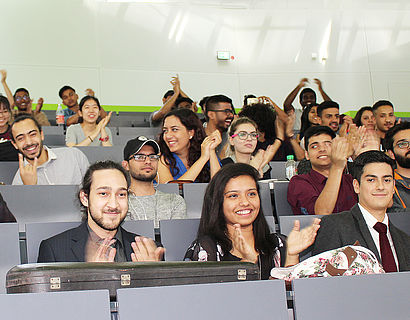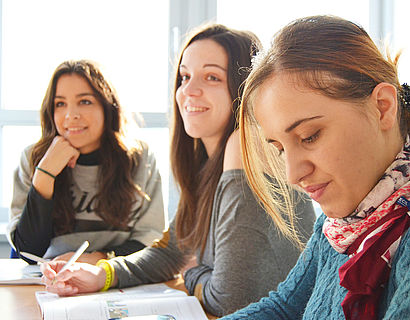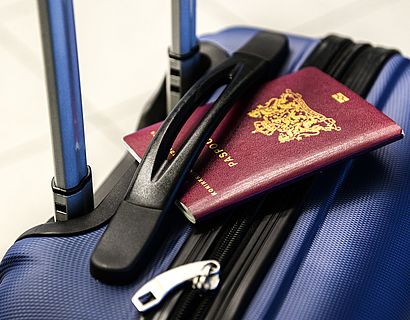Welcome to the Photonics Master at Wildau University of Applied Sciences!
Photonics is considered one of the key technologies and innovation drivers of the 21st century.
It addresses the generation, control and detection of light particles (photons), and enables lasers, quantum computers, autonomous driving, high-speed data transmission, augmented reality displays, lighting, sensor and camera systems as well as health and environmental diagnostics.
The Master's degree programme in Photonics combines academic teaching and research in a comprehensive, technically outstanding way and also enables students - if desired - to obtain a double degree in cooperation with the University of Roma II "Tor Vergata" in Italy.
Key facts
|
Degree |
Master of Engineering |
|---|---|
|
Language of instruction |
German/English, |
|
Modes of study |
full-time, part-time |
|
Standard duration |
4 semesters |
|
Programme start |
winter semester |
|
Fees |
no tuition fees (the university only charges semester fees each semester) |
|
Faculty |
Study objectivesOpen areaClose area
Photonics is an interdisciplinary field with a growing connection between optics and electronics.
Therefore, the course imparts the necessary knowledge and skills, ranging from fundamental physics to high-end laser, plasma, bio-, optoelectronics and quantum technologies.
The program is supported by extensive laboratory exercises, intensive connections to local research groups and a large network of associated institutes and companies in the Berlin-Brandenburg capital region.
Good to know:
The Master's degree programme in Photonics is consecutive to the Bachelor's degree programme in “Physical Engineering / Energy Systems” at Wildau University of Applied Sciences.
Any previous knowledge required for the Master's degree programme in Photonics can be acquired by successfully completing the corresponding modules of the Bachelor's degree programme in “Physical Engineering / Energy Systems”.
Course contentsOpen areaClose area
The course content of the Master's programme in Photonics comprises, among others:
- Optics: materials and tool building, simulation, non-linear optics
- Laser technology, laser material processing
- Surface and microsystems technology
- Measuring technology
- In-depth study of the foundations of physics: classical and quantum mechanics, electrodynamics, solid state physics
- Mathematics: partial differential equations, vector analysis
- Business administration: Business management, project management
- Master’s thesis
Programme modulesOpen areaClose area
The modules of the Master's degree programme in Photonics include:
- Structure of Matter
- Mathematical Methods
- Classical Mechanics, Electrodynamics
- Statistical Mechanics, Thermodynamics
- Quantum mechanics
- Quantum-Technologies
- Measuring Techniques and Instrumentation
- Micro-Technologies
- Technical Optics
- Laser Technologies
- Optical Measuring and Analysis Techniques
- Semiconductor Technologies
- Optical Technologies/ Spectroscopy
- Optical Materials/ Optical Engineering
- Laser Materials Processing
- Ultra-High Frequency Electronics
- Applied Photonics
- R&D-Project 1
- R&D-Project 2
- Project Management
- Business Administration
... and more.
Lecturers of the Photonics Master's programmeOpen areaClose area
As the Master's in Photonics is taught at the technical universities in Wildau and Brandenburg, students have the opportunity to learn from a wide range of professors and lecturers from different areas of science and industry.
Click here to see the lecturers on the Master's degree programme in Photonics.
Career opportunitiesOpen areaClose area
The fields of application of photonics and thus the career prospects for graduates of the master's programme are exceptionally diverse and include:
- Information and communication technology
- optoelectronics
- materials processing
- manufacturing technology
- instrumentation technology
- measurement technology
- semiconductor industry
- print technologies
- biotechnology and medical technology
- environmental
- sensor and microsystems technology
- aerospace technology
- automotive industry.
Excellent career prospects can also be found in the public sector, at universities or research institutions.
Admission requirements and applicationOpen areaClose area
Specific admission requirements
(1) A first professional degree in a relevant field totalling at least 180 ECTS points (CP) in the European Credit Transfer System (ECTS) over a period of study lasting no less than 6 semesters, or an equivalent university degree that is not based on ECTS points, e.g. Diplom or Magister degrees.
(2a) German language skills:
To be admitted to this degree programme, overseas applicants must possess sufficient German language skills. This may be demonstrated with an overall grade of DSH-2 or better from the Deutsche Sprachprüfung für Hochschulen (DSH) language exam.
(2b) English language skills:
Presumably from the winter semester 2026/27, this degree programme will be taught in English.
For admission to this degree programme, applicants must therefore provide evidence of their English language skills in at least one of the following forms from the winter semester 2026/27:
Proof of at least C1 level of the Common European Framework of Reference for Languages (GER) (recognised documents and certificates as in the valid version of the Proof of English Language Skills for Enrolment at TH Wildau -> Link),
OR
Proof of B2 level of the Common European Framework of Reference for Languages (GER) (recognised documents and certificates as in the valid version of the Proof of English Language Skills for Enrolment at TH Wildau -> Link), and successful completion of modules of at least 40 Credit Points (CP) conducted in English in a bachelor’s degree programme that qualifies for admission to thjs master’s degree programme,
OR
Proof of English language skills is also accepted if applicants can prove that they have acquired their higher education entrance qualification or a higher education degree in English.
(3) The specific requirements for the Photonics master’s degree programme include scientific and technical knowledge e.g. in mathematics, physics and chemistry at bachelor degree level. It is therefore required that applicants hold a first degree in a relevant subject area that is comparable to the “Physical Engineering / Energy Systems” bachelor’s degree programme at TH Wildau, or the “Engineering Sciences” degree programme at TH Brandenburg. Suitable degrees for admission include, for example, degrees programmes such as photonics, physics, physical engineering, energy technology, optics/optical technologies, microsystems engineering, semi-conductor technology, electrical engineering, electronics, especially optoelectronics and communications engineering. In case of any doubt, the final decision rests with the faculty Examinations Board.
(4) If these requirements are not met, then students may be admitted on a case by case basis with support provided which will be considered when putting together an individual study plan. In putting this together, it must be ensured that all necessary material will be covered and that an appropriate limit is placed on the amount of work students are expected to do each semester. The final decision on the type and scope of support lies with the Examinations Board.
(5) In accordance with the Regulations of the TH Wildau for the selection of students for degree programmes with restricted admission criteria, a motivation letter written in English will also be required as an admission requirement (in the case of this degree programme), in which the applicant describes his/her motivation for the selected degree programme or why it appeals so strongly over a minimum of two pages and a maximum of three pages. This motivation letter must be submitted on time with the other application documentation.
Application
You can apply to TH Wildau online. All the information you need to apply can be found on this page.
Please note:
For the online application you will be redirected to the page "The Online Portal of the TH Wildau". Please change the language setting in the upper right corner to "English".




